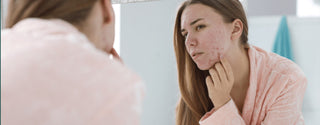True epidemic, acne would affect today until 85% of adolescents aged 11 to 12 and 40 to 55% of the adult population aged 20 to 40. More or less severe, this inflammatory skin disease can affect different parts of the body, face or back. The latest research in dermatology demonstrates the central role of the skin microbiota in the onset of acne and its chronicity in adolescents and young adults.
There are no good or bad bacteria
"For years we were radically mistaken to think that in inflammatory acne there was an overgrowth of Cutibacterium acnes (the new name of Propionibacterium acnes)"Says Pr Brigitte Dreno (1), Dermatologist at Nantes University Hospital."In fact, when you look at the diversity of your microbiome, on average you have less C.acnes in an acne sufferer than in a healthy subject. In contrast, it was found that there were more staphylococci and enterococci in acne patients. », Explains Brigitte Dréno.
Acne is therefore directly linked to the depletion of the skin microbiota (dysbiosis), which is much less diverse in people suffering from acne than in healthy individuals.
This is also the conclusion of a recent study (2) carried out on the microbiota of 24 patients suffering from severe acne compared to 12 healthy volunteers. She demonstrated that the disease was linked to the imbalance between the family of the Propionibacteriaceae and that of the staphylococci, in competition. The researchers deduced that the alteration of the microbiota caused changes in skin pH and triggered inflammation.
Protect the bacterial diversity of the skin and adopt a healthy lifestyle
To fight against acne and prevent recurrence, the solution would be to rebalance and rediversify the microbiota of affected people. But also to break with the bad habits which maintain these dysbiosis. So the use of a local antibiotic could amplify the imbalances instead of improving the health of the skin.
Pr Brigitte Reno warns: the repetition of certain hygiene gestures maintains acne.
- Intensive washing and massage of the skin;
- The use of products with a basic pH (such as natural soaps, alcoholic products);
- Antibacterial solutions or soaps.
The doctor advises against the use of essential oils which can stimulate inflammation (innate immunity) and unsuitable moisturizers.
Our advice to fight against pimples
1 - Cleanse the face twice a day with the mild foaming gel (without soap) Purifying Bubble . In the morning to eliminate the excess sebum secreted during the night and prepare the face to receive anti-blemish active ingredients; in the evening, to eliminate anything that could clog the pores, such as traces of pollution, makeup, sebum, impurities ...
2 - Then, Use the purifying lotion (Morning and Evening) The Night Dew to tighten pores, relieve inflammation of the skin and limit shine.
3 - In the morning, apply the Matte Absolute, a lightweight anti-acne moisturizer that absorbs excess sebum and balances the skin.
4 - Finally, boost your natural defenses and improve the condition of your skin by taking two capsules of Clear Skin cure for a month, 2 to 3 times a year.
(1) Acne: the skin microbiome at the heart of the problem, and the solution, Medscape, August 28, 2019
(2) Dagnelie MA, Montassier E, Khammari A et al. Inflammatory skin is associated with changes in the skin microbiota composition on the back of severe acne patients. Exp Dermatol. 2019; doi.org/10.1111/exd.13988

